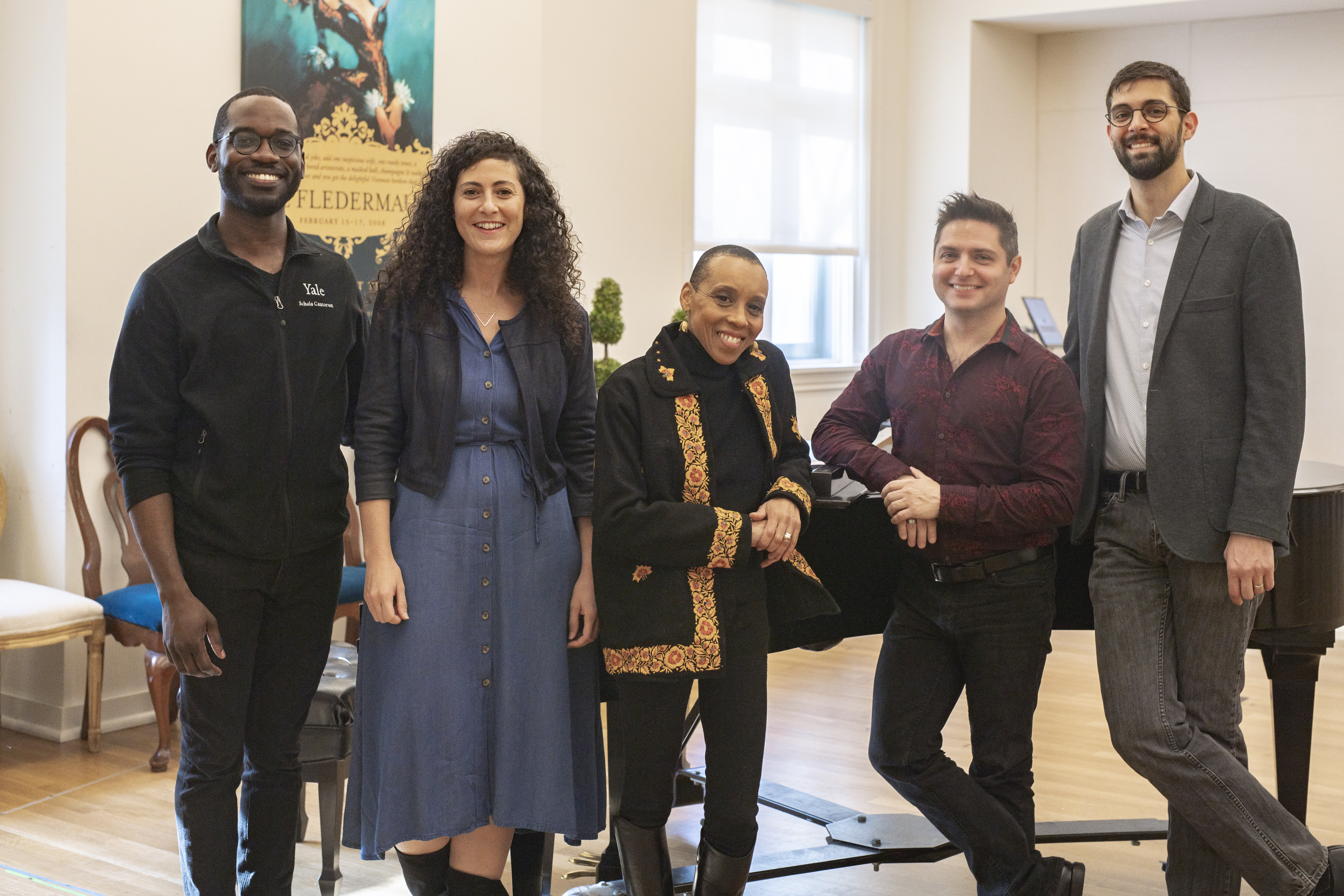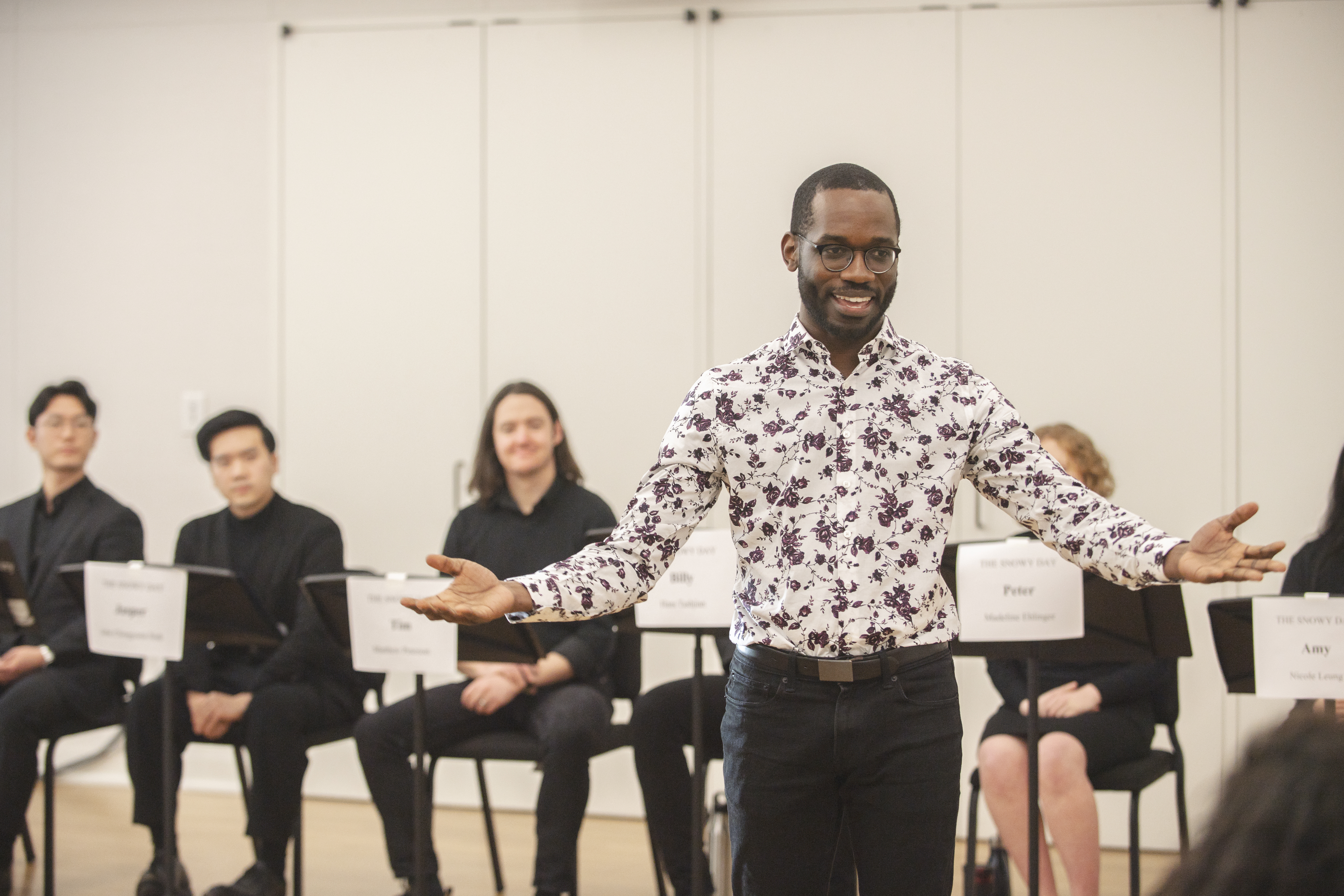An ascendant composer, music for healing
In January, the Houston Grand Opera (HGO) workshopped The Snowy Day, an operatic adaptation of Ezra Jack Keats’ illustrated children’s story that the company commissioned from composer Joel Thompson ’20MMA in 2017. The workshops took place at the Yale School of Music, with members of the Yale Opera program singing the work’s various roles. The HGO will premiere Thompson’s new opera in a production that will run from December 10 through December 20, 2020. Thompson said in a recent interview that he’s nearly done with the writing.
Yale Opera Manager Erika Niemi Heltzel said there was a “really positive atmosphere in the room” during the weeklong workshop, an opportunity that was “huge for Joel and his career” and “an opportunity for our singers, as well.”
“Getting to be part of a new work ... is exciting,” Heltzel said. “The chance to work with the composer” is unique, given that singers in the Yale Opera program typically learn and perform works that have been in their final form for many years.
Soprano Madeline Ehlinger ’20MM appreciated the “collaborative feeling” in the room and the unique opportunity to help inform a work in progress.
In 2017, Thompson was a student at the Aspen Music Festival and School, where he was awarded the Hermitage Prize, an honor bestowed by the Hermitage Artist Retreat (Florida) and the AMFS. Patrick Summers, HGO’s artistic and music director, sat on the Hermitage jury that year and approached Thompson about creating a piece of work for the company.
Thompson’s The Seven Last Words of the Unarmed, a 2015 piece for men’s voices, strings, and piano that was premiered by the University of Michigan’s Men’s Glee Club, won him the Hermitage Prize. In a December 2019 interview with Chicago’s WFMT, Thompson said, “The emotional impetus for the work was the decision of the Staten Island grand jury not to indict the officer whose actions led to the death of Eric Garner. It was in response to that ... that I decided to create a work that would ‘exorcise’ my feelings in response to that decision. I used the liturgical format in Haydn’s Seven Last Words of Christ in an effort to humanize these men and to reckon with my identity as a black man in this country in relation to this specific scourge of police brutality.” The men whose last words are shared through Thompson’s choral piece are Kenneth Chamberlain, Trayvon Martin, Amadou Diallo, Michael Brown, Oscar Grant, John Crawford, and Garner.
“A lot of my music is connected to social issues,” Thompson said. He’s interested in his music being a vehicle for healing.
Thompson, whose family is Jamaican, was born in the Bahamas and moved with his family to Houston at age 10, then a few years later to Atlanta, where he grew up. Thompson’s interest in healing goes back to his pre-college days, when he contemplated a career in medicine. Children of immigrant parents, he said, don’t go into an occupation that lacks security or in which successes are “ephemeral.” Thompson enrolled at Emory University to study piano, which he’d been playing since childhood, having grown up in a musical family, and to pursue the pre-med track. Eventually, music won out. After earning an undergraduate degree from Emory, stayed at the school and earned a master’s degree in choral conducting.
Thompson served as director of choral studies and assistant professor of music at Andrew College, in Cuthbert, Ga., for two years, then taught for a few more years at the Holy Innocents’ Episcopal School in Atlanta, before enrolling at the Yale School of Music.
“It was really meeting [faculty composer] Christopher Theofanidis at Aspen,” Thompson said, that attracted him to the School of Music’s composition program. He’d grown up hearing Theofanidis’ music in Atlanta, where it has been championed by Atlanta Symphony Orchestra Music Director Robert Spano. Theofanidis’ colleagues in the School’s composition program were also an attraction for Thompson.
Thompson is writing music for the present, he said, music that’s “intellectually appealing and stimulating to me.” With each piece, he’s “creating an experience that can lead someone to want more.”







